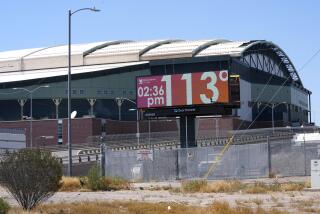In Documents, Lewinsky Admits to Telling Lies
Monica S. Lewinsky testified last month that Linda Tripp urged her to demand a job from a confidant of President Clinton in exchange for signing an affidavit denying an affair with the president, according to new documents released Monday.
Lewinsky admits falsely telling Tripp, who was surreptitiously recording their conversations at the time, that she had indeed followed her counsel and told the president’s advisor, Vernon E. Jordan Jr., in essence “no job, no affidavit.”
Said Lewinsky: “There were times that I was not truthful to her.”
This item, drawn from Lewinsky’s grand jury testimony, is buried among the 3,183 pages of supporting documents that the House Judiciary Committee made public Monday from independent counsel Kenneth W. Starr’s investigation. It is one of several disclosures that shed new and unflattering light on key witnesses or investigative tactics in the high-stakes inquiry--and were not included in Starr’s 445-page impeachment report to Congress.
The allegation that Clinton and Jordan sought to obtain a job for Lewinsky to keep her quiet about the affair was instrumental in Starr receiving authority to expand his Whitewater inquiry to include the president’s relationship with the former White House intern. It also formed the basis of an allegation that Clinton obstructed justice in Starr’s report to Congress, although Starr did not specifically cite Lewinsky’s lie to Tripp in justifying the charge.
Overall, the documents raise new questions about the veracity of important witnesses in the case and show Lewinsky concurring with Clinton’s account on additional key points. The new information also provides ammunition to critics who claim that Starr overreached in his initial interrogation of Lewinsky and the lurid admissions he later sought from her about sexual acts with Clinton.
“Clearly the evidence released today presents a murkier and far more ambiguous set of circumstances than Starr presented in his own report,” said Jim Jordan, spokesman for the Democrats on the House Judiciary Committee. “If this was, as we’re led to believe, Starr’s strongest evidence and proof of his case, I feel quite sure the world will look far different when 16 boxes of documents are released in a week.”
Starr’s spokesman, Charles G. Bakaly III, said, “We really don’t have much to add about” the newly disclosed evidence. “We provided the information” as required to Congress.
The new information appears to do little to undercut the allegation that Clinton lied by testifying that he and Lewinsky did not engage in sexual relations because they did not have intercourse. And much of it supports Starr’s overall case against the president.
But Clinton defenders contend the new documents show that Starr’s report to Congress was excessively prosecutorial in tone rather than dispassionate in presenting evidence of potentially impeachable offenses.
To counter Starr’s assertion that Clinton obstructed justice by suggesting that Lewinsky prepare a false affidavit in the Paula Corbin Jones sexual harassment case, Clinton allies pointed to Lewinsky’s statement to the grand jury: “No one asked or encouraged me to lie.”
One lawyer close to the Clinton defense team said Lewinsky’s description of the cover story worked out with the president to hide their relationship long predated her involvement as a potential witness in the Jones lawsuit.
“Lewinsky’s testimony is surprisingly helpful in the sense that on many issues she appears more or less congruent with the president” in terms of alleged impeachable offenses such as obstruction of justice and tampering with a witness, the lawyer said.
In addition, Lewinsky paints Tripp as far more than a passive recipient of information. Lewinsky said that Tripp first suggested that Lewinsky urge Clinton to ask Jordan to help her find a job.
But Lewinsky said she deceived Tripp about her dealings with Jordan, fearing that her friend might betray her confidence.
Lewinsky’s concerns proved well-founded. When she met with Tripp last January, her friend was wired by Starr’s prosecutors. Lewinsky was so suspicious, she said, “I told her a whole bunch of lies.” Lewinsky said she even checked Tripp’s bag for a tape recorder when her friend went to the bathroom.
Lewinsky also said Tripp encouraged her not to wash the stained, navy blue dress that contained evidence of one of Lewinsky’s trysts with Clinton.
“She told me that I should put it in a safe deposit box,” Lewinsky testified.
Lewinsky’s testimony also reignited questions about Starr’s actions during the 10 hours on Jan. 16 when his assistants confronted her with Tripp’s evidence of the former White House intern’s affair with Clinton and offered her immunity in exchange for cooperation.
Lewinsky testified that prosecutors wanted her to “place calls or wear a wire” to secretly record conversations with Jordan, presidential secretary Betty Currie and “possibly the president” before their relationship was publicly disclosed.
Starr has denied any such intent.
An FBI report of events that day says that one of Starr’s deputies spoke to Bernard Lewinsky by telephone about his daughter’s cooperation with the investigation. The report states that “an interview, telephone calls, body wires and testimony were mentioned.”
Said the lawyer close to the president’s defense team, “Their true purpose was to ensnare the president.”
More to Read
Start your day right
Sign up for Essential California for news, features and recommendations from the L.A. Times and beyond in your inbox six days a week.
You may occasionally receive promotional content from the Los Angeles Times.





